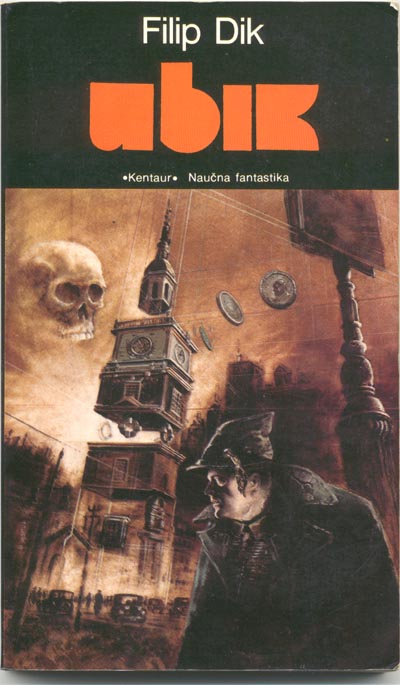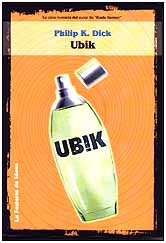October 25, 2005
Ubik as petit objet a

'He wondered how much difference Ubik – dangled towards them again and again and again in countless different ways but always out of reach – would have made.'
- Philip K Dick, Ubik
Everyone knows that the moment of vertigo in a Philip K Dick novel occurs not when one level of reality has been exposed as fake, but when the second level, the supposedly more real level, turns out to be inauthentic too. Here, we move beyond the familiar sense that 'things are not as they seem' to a mis en abyme in which, by implication, the status of reality as such is undermined. Dick's signature concept is not the notion that this or that reality is fake but the idea that any reality whatsoever is false.
Steven Shaviro explains that '[f]or Dick, Being is not a plenitude. It is always somehow fake, or trashy, or incomplete, or unstable or radically inconsistent. And Dick's novels describe, in excruciating detail, the lived experience of this unreality, or not-quite reality, that is not yet simply absence or nonexistence'. These experiences are not a consequence of finding oneself in a particular, low-grade reality; rather, they follow from living in any reality, which will be experienced as seedy and second-rate simply because one lives in it.
Dick's novels, then, are a sustained meditation on the difference between reality and the Real. Reality is what is available to us as possible experience in any lifeworld. The Real, however, is what has to be in place so reality can function, the 'something else' that must be presupposed in order that we can experience anything at all. Yet this hyper-structure is not evident insofar as it undergirds or guarantees experience, but only where it fails to do so: in the gaps, fissures and ruptures in reality. The Real is the trauma around which reality is structured; although it is not possible to experience it as such or 'in-itself' (The Real is impossible...) its effects can be felt through 'ripples of distortion' in the structure of reality (... but it happens). As Zizek puts it in Plague of Fantasies, reality is 'what constitutes reality is the minimum of idealization the subject needs in order to sustain the horror of the Real.' (66)

In Ubik Joe Chip's reality famously corrodes, devolves, falls prey to the entropy that is one of the ruling forces in Dick's cosmos (and ours). Everything he touches decays and collapses; cigarettes turn stale in the pack, milk instantly sours. (It's tempting to read Ubik as an account of depression, a condition which similarly devivifies everything with which it comes into contact. In fact, of course, Ubik probably draws heavily on Dick's experiences with speed come-downs.) As all heat passes from Joe and he becomes pure weight (remember the horrifying slow motion climb up the stairs, his body by now a barely movable bulk oppressed by a hideous gravity), he is rescued by the spraying of an aersol can of Ubik, the all-purpose 'reality support' which now begins to appear - fleetingly and tantalisingly – everywhere. (The novel, with its quest form, its magical objects, its benevolent and malevolent messages from those supposed to know - Runciter, Elly, Jory - is like a computer game programmed by a Lacanian.) Joe's quest for the Holy Grail of Ubik faces multiple, bad dream frustrations – the worse being when the can is regressed to an earlier mode so that it becomes useless. Looking at what is now a tin of liver balm, Joe reflects mordantly on the cheerless irony that a solution to temporal regression has itself been devolved into an earlier form of itself.
What is Ubik - that which is 'dangled towards [us] again and again and again in countless different ways but [which remains] always out of reach' - if not the petit objet a? Ubik, which appears in the narrative (and in the ad-parody epigraphs of each chapter) as a diversity of commodities, seems to promise fullness, a being restored to plenitude. And Joe is apparently blocked from this fullness only by particular contingent facts: the shop is closed, they are out of stock etc etc. Like the objet a, Ubik is both a gap in the reality structure (pointing to 'something else', a beyond, an alternative to shoddiness and seediness) but also a 'reality support' (that which literally 'keeps us going', keeps us wanting).
Posted by mark at October 25, 2005 06:58 PM | TrackBack